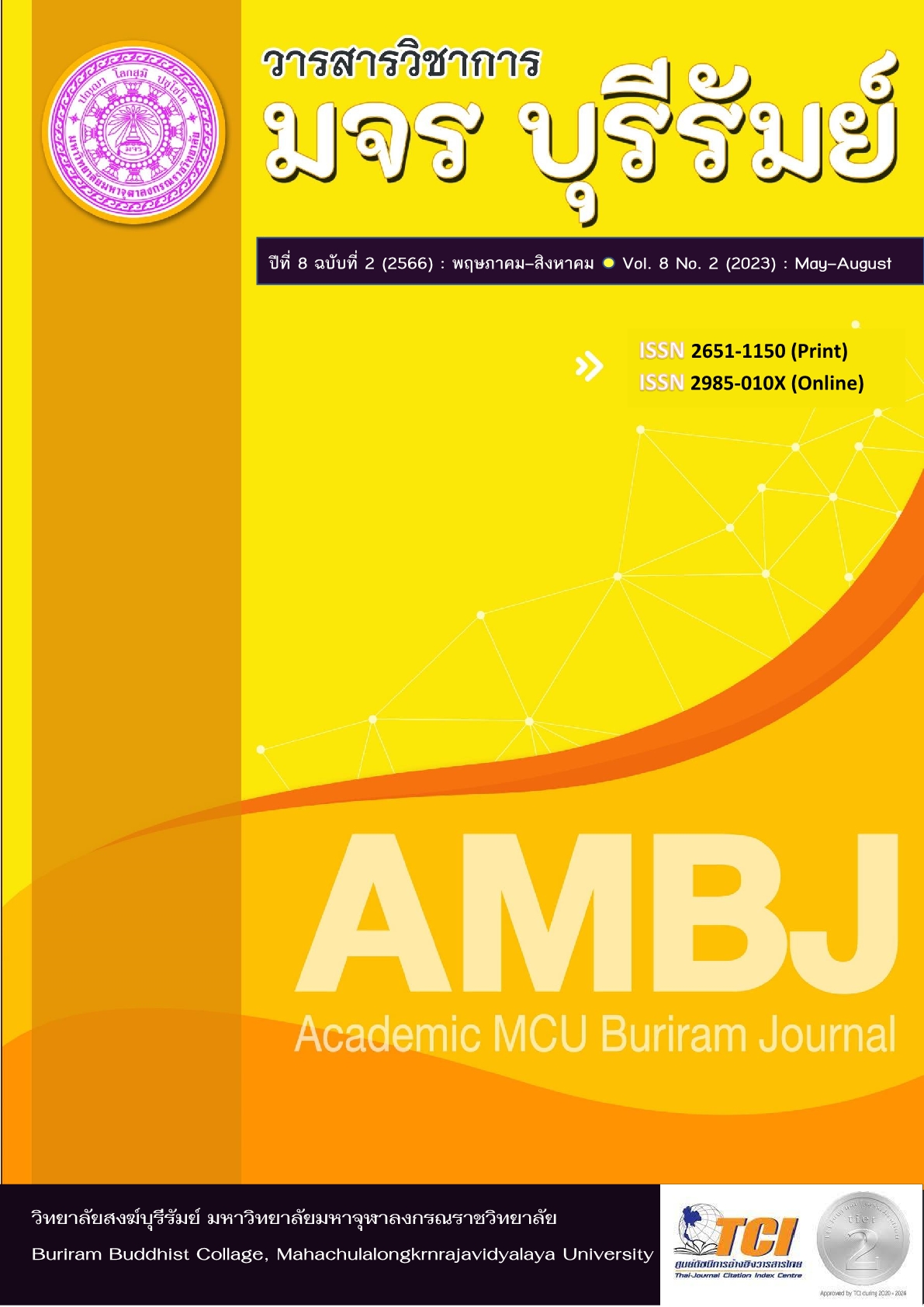Application of Sammà-àjãva Principle in Promoting the Occupation of Ban na thawi Community, Ban na thawi District, Songkhla Province
Keywords:
Application, Sammà-àjãva PrincipleAbstract
The purpose of this research were: 1) To study the occupation of Ban Na Thawi Community, Ban Na Thawi District, Songkhla Province, 2) To explore of Samma Ajiva in Theravada Buddhism, and 3) Apply the application of Samma Ajiva principle in the occupation of Ban Na Thawi Community, Na Thawi District, Songkhla Province. It is qualitative research focusing on document research.
The research results found that:
1. Occupation of Ban Na Thawi sub-district Community involved with micchà vanijjà, trades which should not be plied by a lay disciple, or unethical occupation. This is a forbidden occupation in Buddhism, which is misconduct and contrary to the culture of people in Thai society. This can lead to social disorganization, conflict, and social disorganization.
2. The principle of Sammà-àjãva in Buddhism encompasses moral principles of physical, verbal, and mental conduct in the work of obtaining the right property by refraining from making a living in an unsuitable way, with a verbally pleasing. It is charitable with the right livelihood and integrity, also with mental well-being as a guideline leading to inner happiness. It is a way of life based on the Sammà-àjãva principle.
3. The principle of Sammà-àjãva is non-immoral occupational practices and the laws of the country, based on ethics as the basis for conducting oneself without engagement in corrupt careers. Sammà-àjãva is conducive to peace in Ban Na Thawi Community as it is the right livelihood that is immoral and not against the law.
References
คณาจารย์ มหาวิทยาลัยมหาจุฬาลงกรณราชวิทยาลัย. (2553). มนุษย์กับสังคม. พิมพ์ครั้งที่ 6. กรุงเทพมหานคร: โรงพิมพ์มหาจุฬาลงกรณราชวิทยาลัย.
ดารณี กริชชาญชัย. (2548). การใชหลักพุทธธรรมในการบริหารธุรกิจขายส่ง. สารนิพนธ์ศาสนศาสตร มหาบัณฑิต สาขาวิชาพุทธศาสนศึกษา. บัณฑิตวิทยาลัย: มหาวิทยาลัย มหามกุฏราชวิทยาลัย.
ประสาทสุข นิยมราษฎร์ และคณะ. (2549). การศึกษาการพัฒนาศักยภาพการประกอบอาชีพของสตรีและยาวชรในสามจังหวัดชายแดนภาคใต้. รายงานการวิจัย. สำนักงานคณะกรรมการวิจัยแห่งชาติ.
พระชีพ รกฺขิตธมฺโม (แก้วนิล). (2563). การประชุกต์ใช้หลักสัมมาอาชีวะในการเสริมสร้างครอบครัวไทยให้เกิดความมั่นคงในสังคมยุคดิจิทัล. วารสารมหาจุฬานาครทรรศน์, 7(5), 148-157.
พระเทพเวที (ป.อ. ปยุตฺโต). พุทธธรรม. (2532). พิมพ์ครั้งที่ 5. กรุงเทพมหานคร: โรงพิมพ์มหาจุฬาลงกรณราชวิทยาลัย.
พระธรรมปิฎก (ป.อ. ปยุตฺโต). (2546). พจนานุกรมพุทธศาสตร์ฉบับ ประมวลธรรม. พิมพ์ครั้งที่ 12. กรุงเทพมหานคร: โรงพิมพ์มหาจุฬาลงกรณราชวิทยาลัย.
พระธานี เขมธมฺโม (จำปา). (2550). ศึกษาสัมมาอาชีวะในพระพุทธศาสนา. ปริญญาพุทธศาสตรมหาบัณฑิต. บัณฑิตวิทยาลัย: มหาวิทยาลัยมหาจุฬาลงกรณราชวิทยาลัย.
สุเทพ สุวีรางกูร. (2554). สังคมวิทยาตามแนวพุทธศาสตร์. กรุงเทพมหานคร: โอเดียนสโตร์.
Downloads
Published
How to Cite
Issue
Section
License
Copyright (c) 2023 Academic MCU Buriram Journal

This work is licensed under a Creative Commons Attribution-NonCommercial-NoDerivatives 4.0 International License.
ทัศนะและความคิดเห็นที่ปรากฏในบทความวารสารฉบับนี้ถือเป็นความรับผิดชอบของผู้เขียนบทความนั้น ไม่ถือเป็นทัศนะและความรับผิดชอบของบรรณาธิการ





